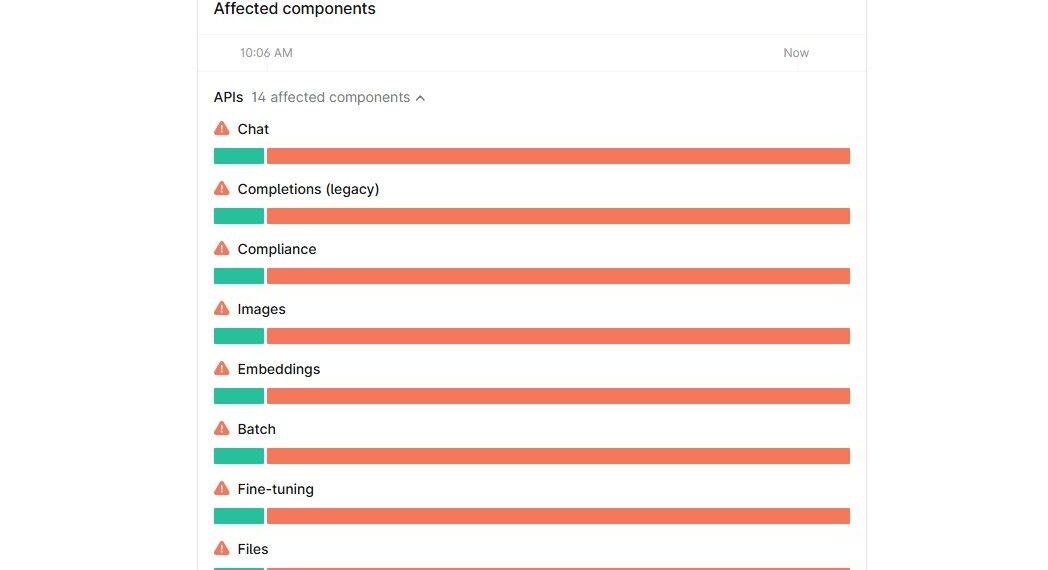Select Language:
Date: June 10, 2025 — ChatGPT Outage Impact
Today, if you tried to access ChatGPT for homework assistance, coding help, or even just to plan a workout, you likely found a frustrating silence. This isn’t the first outage we’ve experienced, nor will it be the last. But each time, the consequences seem to weigh heavier on our everyday lives.
Another Breakdown: What’s the Deal?
My first hint something was off came when I requested a workout routine and was met with a confusing jumble of text, followed by silence. After checking my VPN and restarting my browser, I glanced at OpenAI’s status page, which was littered with red alerts indicating widespread issues.
OpenAI’s official message states they’re "investigating elevated error rates," but the reality is that a vital component of the internet has temporarily shut down. This outage goes beyond just the ChatGPT website; it’s a complete failure of the API. If you’re not a developer, that may sound technical, but it’s significant. Many applications you use daily don’t have their own intelligence; they rely on larger frameworks, with OpenAI being a key player. Every service powered by OpenAI—from AI-driven image creators to writing tools—is essentially disrupted.
Personal and Professional Fallout
On a personal level, this situation feels like an inconvenience. I had planned a Dungeons & Dragons session using ChatGPT as our Dungeon Master, which now appears to be on hold. While that might seem trivial, it illustrates how deeply integrated this technology has become in our daily activities.
However, the stakes are far more serious than a canceled game night. If you’re a student depending on AI for brainstorming essays, a programmer using it for debugging, a marketer crafting ad copy, or a blogger generating topics, your productivity has taken a significant hit. On a larger scale, the implications are dire. We’ve seen a rush to adopt AI tools across nearly every industry. What happens to a marketing agency that relies entirely on AI for content production? What about a legal tech firm that uses AI to streamline case law summaries? In government, what do we do about public services that have been "optimized" using AI?
Concentrated Risk in AI Dependency
Tech companies often tout "99% uptime," making it sound impressive. However, this is merely an acknowledgment that failures will happen. While downtime for a small app might be annoying, when a major service like OpenAI goes offline, it feels like a citywide blackout.
A single ChatGPT API key can now replace the work done by numerous employees handling routine tasks, which appeals to organizations aiming to improve efficiency and cut costs. But this creates a delicate system. Just one technical error, a security breach, or a simple internet problem at a data center can bring entire companies—or even industries—to a standstill.
The Challenge of Personalization
A few years back, if ChatGPT was down, it was easy to switch to a competitor like Gemini or Claude. However, that’s becoming increasingly difficult due to personalization. Each instance of ChatGPT has become uniquely tailored to its user—remembering previous conversations and adapting to individual styles. This personalization locks us into a specific AI service; switching to another means starting from scratch and losing that valuable context that makes the tool truly useful. We’ve confined ourselves to these digital ecosystems, now left waiting for them to come back online.
The Unmasking Effect of Outages
Interestingly, an AI outage can also function as a revealing truth serum. Artists who have relied on generative AI for their "unique" creations may find themselves silenced. Content farms masquerading as legitimate outlets could face delays and unmet deadlines, ultimately exposing their reliance on AI to produce work.
This leads to serious questions: What happens if a hospital’s AI system for analyzing patient scans goes offline? How equipped are doctors who have come to depend on AI for diagnoses?
Losing the Human Touch
The most concerning aspect of such outages is the gradual decline of human skills. Imagine a manager deciding to replace a talented senior writer with a recent graduate who excels at prompting ChatGPT. Initially, it might seem smart. Yet when ChatGPT fails, the junior employee is left struggling without the foundational skills required for writing or problem-solving. The ability to draft a press release or critically analyze situations is a skill, and just like any skill, it deteriorates without practice. The true cost of the AI revolution might not just be job losses but the critical abilities we are willingly relinquishing.
Update: OpenAI is addressing the issues, and some users are regaining access. If you’re still experiencing problems, check back in a bit.







